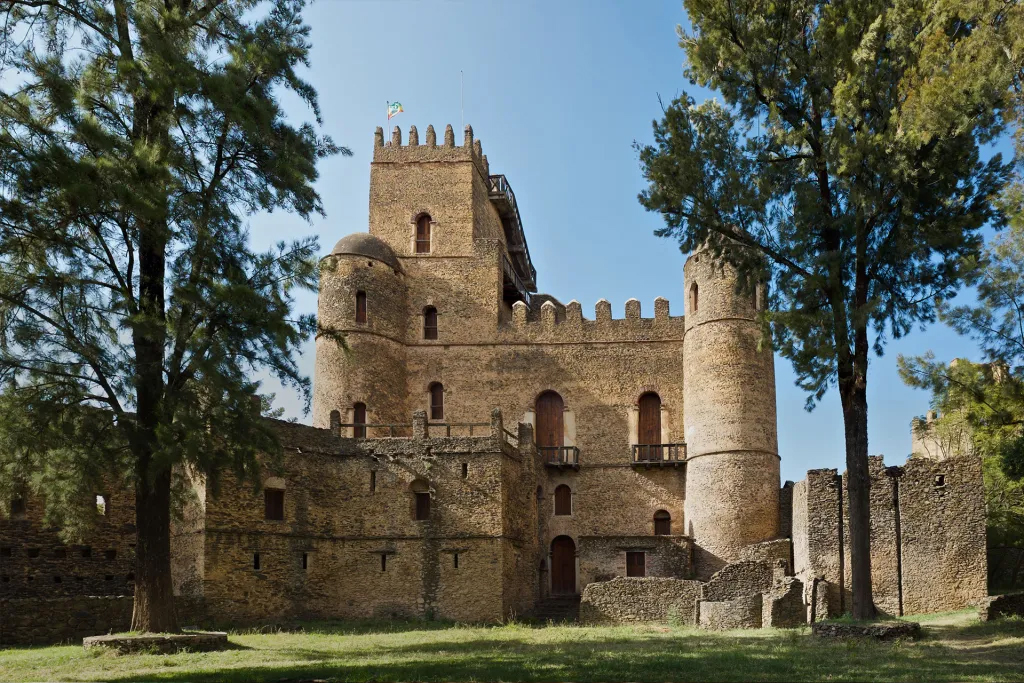Whether you’re interested in the ancient ruins, the stunning landscapes, the people’s brightly colored traditional Ethiopian attire, or the delicious food, there’s something for everyone in Ethiopia. So, if you’re looking for an amazing travel destination, add Ethiopia to your list!
But what’s it really like to live in Ethiopia?
The Ethiopian Side of Life
Lifestyle Slogan
Notably, the Ethiopian calendar is divided into 13 months and has even inspired a book titled “Thirteen Months of Sunshine” by renowned author Dr. Worku Mulat. The “13 Months of Sunshine” logo has been synonymous with Ethiopian life for the past five decades –so much so that their national airline carrier has adopted it as part of a tourism campaign.
The Ethiopian People
Ethiopia boasts the second–largest population in Africa. More than half of her inhabitants are under the age of 25. Its inhabitants are vastly diverse and count no more than 80 different ethnic groups in the country. Some include the Amhara, Tigrayans, Gumuz, and Sidama people.
As much as Ethiopia features diversity, its people are steadfastly united by a sense of pride and patriarchy in their cultural identities. When visiting the country, it’s crucial to acknowledge that cultural customs vary greatly for each ethnic group.
What sets Ethiopia apart from the rest of Africa is that it’s one of the only countries that have resisted European colonisation. The Ethiopian folk typically identify as habesha (a word that now encompasses all the ethnic groups of the country).
Customs and Traditions
Ethiopians live a cultural life of collectiveness, known as mahiberawi nuro (community life). They still practice many of their customs, and daily life is based on century–old traditions. For example, there’s a particular way to greet folk and indulge in coffee traditions.

Greeting One Another
Deeply embedded in their roots is the custom of greeting each other in specific ways. Unlike for instance the hearty way in which South African men will enthusiastically shake hands in greeting, the Ethiopians have a much gentler mannerism.
Men tend to greet each other with a slight shake of the hand while pulling each other into an embrace and rubbing the other one’s back in the process. Three kisses on the cheek are also reserved for close friends and family.
Easter Traditions
Out of all the celebrated holidays in this country, Easter is commemorated the most. The Ethiopians that are Orthodox Christians can worship for hours on end and fast the entire time by eating no animals or animal by-products.
On Easter eve, worshippers attend lengthy church sermons until sunrise the next morning, clothed in white garments. After all that worshipping, the churchgoers surely have an appetite. It’s here that they then indulge in the folk–favorite butter–loaded doro wat (spicy chicken stew drenched in butter).
Coffee Traditions
Another chatty fact about Ethiopians is that its common practice for playdates and other social engagements to occur without prior notice or arrangements. Their idea of a healthy social life includes drinking coffee on the streets and watching the locals passing by.
Ethiopian coffee ceremonies are geared to bring people together!
Food, Glorious Food
Ethiopians love food! They regularly feast on injera and wot, a popular bread and stew dish. This meal (and others) are usually presented on a shared platter and consumed sans eating utensils. Individuals help themselves by typically scooping food with their right hand and then feeding themselves directly to their mouth.
We’ve Got You Covered
Ethiopians sure know how to live! From their active social lives full of music and dance to the bustling markets where you can find almost anything, there is so much to love about this country.
And of course, we can’t forget about the delicious food! Injera and wot are two staples for every red–blooded Ethiopian individual.


